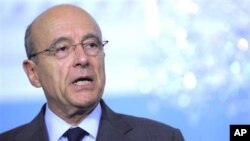France was a leading critic in the U.S.-backed campaign to oust Iraqi leader Saddam Hussein. Now it is on the forefront of international efforts against other authoritarian Arab regimes.
The French fighter planes hurtling over Paris this Bastille Day have been in demand in recent weeks.
France prominent in anti-Gadhafi fight
France was the first NATO member to launch airstrikes against Moammar Gadhafi's regime this year. It was also the first country to recognize Libya's Transitional National Council, with authorities confirming Paris has provided light arms to the rebels.
On Tuesday, parliament voted to extend funding for France's intervention in Libya. Foreign Minister Alain Juppe says the government has had contacts with the Libyan regime on Gadhafi's possible departure, and suggests a political solution may be taking shape.
In a radio interview, Juppe said it appears inevitable Gadhafi will step aside and the African Union, in particular, could play a positive role.
Tough stance against Syria
France is also taking a tough stance on Syria. It helped spearhead a draft U.N. resolution condemning the government's crackdown on protesters. This week, Prime Minister Francois Fillon had harsh words for Syrian President Bashar al-Assad.
Speaking on Europe 1 radio, Fillon said Assad has broken all the limits. He also criticized as "insupportable" the silence at the U.N. Security Council, where China and Russia are blocking the resolution.
France's muscular position stands in sharp contrast to a few years ago, when former president Jacques Chirac was a leading critic of the U.S.-led campaign in Iraq. So what explains the change?
Analyst Claire Spencer, the Middle East and North Africa programs head of London's Chatham House, points to a more pro-U.S. stance under France's current president, Nicolas Sarkozy.
"I think the sense was although perhaps they made the right decision with hindsight over Iraq, the cost to France in terms of feeling isolated in the aftermath, certainly being vilified in the States," said Spencer. "You remember the cheese-eating surrender monkeys comment at the time, made the French feel that they really did not have the role they felt they should play."
Spencer notes France's position has changed toward Tunisia as well, as it champions the fledgling democracy there. But Paris has been criticized for its once-close ties to the authoritarian regime of former president Zine el-Abidine Ben Ali. One more reason, Spencer says, for being tough on Gadhafi.
"I feel very much that the role played by France in Libya particularly was a way of making amends for that and saying we are actually going to take a lead and make things all right here," she said.
Success not guaranteed
But it is unclear just how successful French efforts will be in the Arab world. Analysts say there are no easy exit strategies for either the Libyan or Syrian crises.
Separately, France is also pushing for a Middle East peace conference, despite reservations by both Washington and Israel. Paris also suggests it might recognize Palestinian statehood if peace talks remain in stalemate.
"Well, they have a voice," said Spencer. "But, I am afraid, just as the European Union has found on Israel-Palestinian issues, it is always assumed and seen that it is the American position which holds sway."
France is hardly the only country flexing its diplomatic muscles in the Arab world. Turkey says it will present a "road map" for resolving the Libyan conflict when countries backing NATO's mission there meet on Friday.




